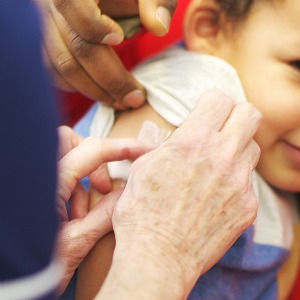GPs should consider pertussis as a cause of persistent cough even in children who have been immunised, suggests a study that has found a fifth of school-age children presenting to the GP with persistent cough may be infected.
Experts say that the study published in the BMJ shows that GPs should not assume that vaccination gives ‘absolute protection’ and reopens the debate on whether a additional adolescent booster programme should be introduced.
The study found that 20% of children presenting to GPs with persistent cough had evidence of recent pertussis infection, of whom 39 (70%) had been fully vaccinated with both primary vaccinations and the pre-school booster.
The study’s authors said this shows whooping cough in school-age children remains a concern several years after the introduction of the pre-school pertussis booster vaccination.
Researchers led by Dr Kay Wang, academic clinical lecturer in primary care at the University of Oxford, studied 279 children in the Thames Valley area who visited the GP with a persistent cough, over 90% of whom had received all their primary school vaccinations and around 80% the preschool booster.
They study found the prevalance of whooping cough was lower than around the time the preschool booster was first introduced in 2001 – when a similar study found pertussis in 37% of children with persistent cough – but that there was still a ‘significant burden of illness’.
The rate of pertussis infection was 40% in children who had received the preschool booster more than seven years before presentation – over three times higher than in children who had received the preschool jab more recently, for whom the rate of infection was 12%.
Related stories
Analysis: ‘GPs must remain on their guard about whooping cough’
GPs urged to keep up whooping cough jabs campaign in pregnant women
Whooping cough vaccination campaign could be extended to adolescents
The researchers wrote: ‘Our findings show that a significant burden of illness associated with pertussis remains among school-age children who present in UK primary care with persistent cough, even after implementation of the preschool pertussis booster vaccination and despite high levels of vaccination coverage.’
Dr Wang told Pulse: ‘The message for GPs is that whooping cough is still prevalent among school-age children who see them with a persistent cough, even after the introduction of the preschool booster.’
She added: ‘In terms of vaccination policy, it is still too early for us to tell whether an adolescent booster should be introduced in the UK. Although our findings highlight that whooping cough is still prevalent in this particular group, still more evidence is needed about the burden disease – we need to consider whether or not introducing an adolescent booster would be cost-effective.’
Dr Richard Vautrey, GPC deputy chair and lead on immunisation, said the study highlighted the importance of keeping up awareness of whooping cough and for GPs to keep encouraging pregnant women to have the pertussis booster.
Dr Vautrey said: ‘It is important for GPs to be aware of this as a possible cause for persistent cough even when children have been fully immunised – not to assume that that’s going to provide absolute protection. We need to be aware the infection is still around and ensure that those who are vulnerable are protected – and that’s particularly the case for pregnant women and newborn babies.’
He added: ‘There hasn’t been as much focus or publicity around that [pregnant women campaign] recently and yet we are aware that it continues to be a concern. It is important that pregnant women are encouraged do get themselves immunised so they protect not only themselves but also their baby and the more we can publicise and promote that the better.’
Public Health England (PHE) introduced the temporary booster vaccination for pregnant women to help protect newborn infants from whooping cough, following a major outbreak in 2012. Since then, surveillance data has shown a 51% reduction in cases of whooping cough in England between 2012 and 2013, but GPs are still being encouraged to keep promoting the vaccine to pregnant women.
In addition, Government advisors on the Joint Committee on Vaccinations and Immunisations (JCVI) are in ongoing discussions about the potential introduction of an adolescent programme, but PHE said the pertussis vaccination programme in pregnant women remained the priority for controlling whooping cough, while other booster programmes are ‘being kept under review’.
Dr Mary Ramsay, PHE’s head of immunisation said: ‘Although we have seen a significant decrease in cases there are still high numbers of older children and adults becoming infected and can risk exposing very young babies.
‘When the JCVI recently considered several options for improving the control of whooping cough in the UK the vaccination programme for pregnant women was considered to be the highest priority.
‘However, the committee regularly reviews updated scientific analysis and the introduction of additional whooping cough boosters is being kept under review. Any new programmes or amendments to the existing programme will be announced at the earliest possible date.’
BMJ 2014; available online 25 June

















